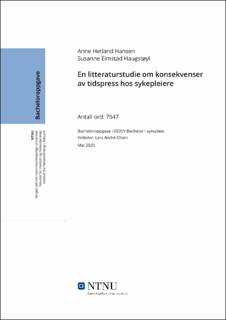| dc.contributor.advisor | Olsen, Lars André | |
| dc.contributor.author | Hansen, Anne Hetland | |
| dc.contributor.author | Haugstøyl, Susanne Eimstad | |
| dc.date.accessioned | 2020-07-07T16:07:44Z | |
| dc.date.available | 2020-07-07T16:07:44Z | |
| dc.date.issued | 2020 | |
| dc.identifier.uri | https://hdl.handle.net/11250/2661217 | |
| dc.description.abstract | Bakgrunn: I dagens helsevesen blir mange sykepleier utsatt for høyt tidspress. Det settes krav til at helsehjelpen som utøves skal være forsvarlig og av god kvalitet. Med dagens økte effektivitetskrav, kan dette få ulike konsekvenser for pasientsikkerheten. På bakgrunn av dette ønsket vi å se nærmere på hvilke konsekvenser som kan oppstå som følge av lite tid hos sykepleiere.
Hensikt: Hensikten med denne oppgaven er å sette lys på sykepleiers oppfatning av tidspress på
arbeidsplassen, og deres erfaringer ved hvordan tidspress kan få konsekvenser for pasientsikkerheten.
Metode: Oppgaven benytter en systematisk litteraturstudie som består av åtte forskningsartikler. Av disse er to kvalitative og seks kvantitative.
Resultat: Resultatet viser at tidspress har ulike negative konsekvenser for pasientsikkerheten. Tidspress fører til avvik i pasientbehandlingen. Det er fire avvik som går igjen; feil i administrering av medikamenter, feilaktig dokumentasjon, mangelfull observasjon, samt utilstrekkelig emosjonell støtte og opplæring av pasient.
Tidspress vil også kunne gå ut over sykepleiers helse, samt miljø på arbeidsplassen.
Konklusjon: Man ser at tidspress har negative konsekvenser for sykepleien som blir gitt, og kan dermed true pasientsikkerheten. Tidspress vil ikke bare få konsekvenser for sykepleien, men også sykepleier.
Nøkkelord: Nurses, Nurse attitude, quality of healthcare/ quality of nursing care /quality of care, holistic nursing og time pressure/time factor | |
| dc.description.abstract | Background: In today’s health service, many nurses are exposed to a high time pressure. There are requirements that the health care provided should be sound and of good quality. With today’s increased efficiency requirements, this can have different consequences for the patient safety. Based on this we wanted to look closer on which consequences that may arise as a result of shortage on time for nurses.
Purpose: The purpose of this thesis is to shed light on nurse’s perception of time pressure/time factor at the workplace, and their experiences on how time pressure can impact the patient safety.
Methodology: The thesis is using a systematic literature study consisting of eight research papers. Two of the papers used are qualitative and six are quantitative papers.
Findings: The result is illustrating that time pressure has various negative consequences for the patient safety. Time pressure leads to deviations in patient treatment. There are four errors recurring; errors in medication administration, incorrect documentation, inadequate observation and insufficient emotional support and patient education. Time pressure can also affect the health of the nurse, as well as the environment in the workplace.
Conclusion: One can see that time pressure has negative consequences for the nursing that is given, and thus can endanger patient safety. Time pressure is found not only having consequences for the nursing but also the nurse.
Key words: Nurses, Nurse attitude, quality of healthcare/ quality of nursing care /quality of care, holistic nursing and time pressure/time factor | |
| dc.publisher | NTNU | |
| dc.title | En litteraturstudie om konsekvenser av tidspress hos sykepleiere | |
| dc.type | Bachelor thesis | |
